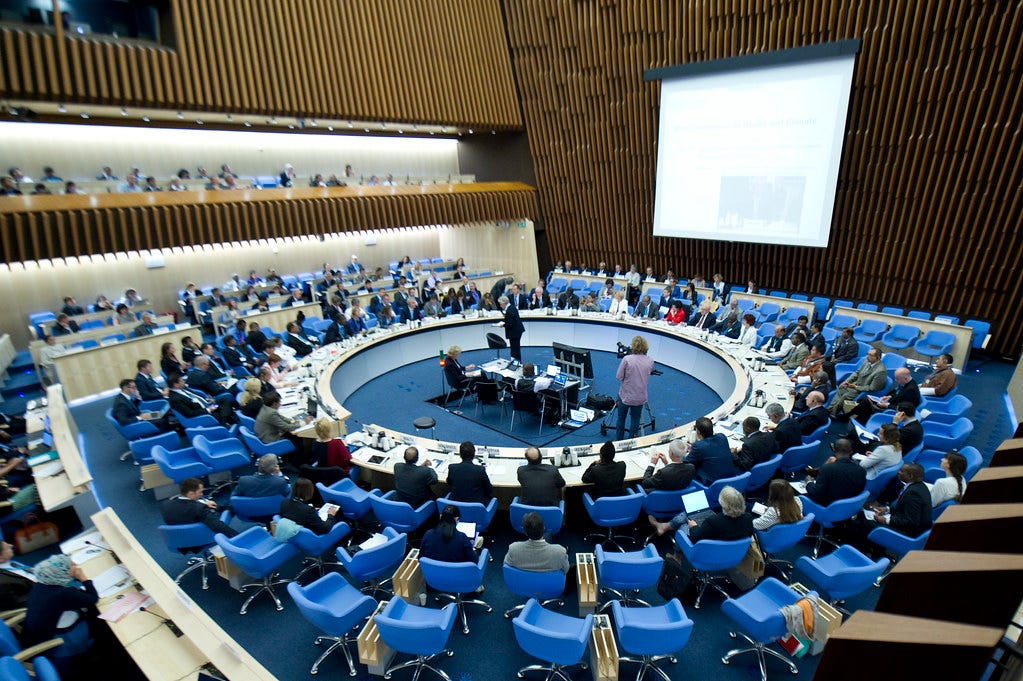The 2005 decision that made the 2020 pandemic an inevitable event
The regulation that made it a disaster waiting to happen
In 2005, 194 countries updated the binding International Health Regulations (IHR) with a clause saying that unless the WHO recommends travel restrictions, other countries are supposed to refrain from imposing travel bans or trade restrictions on nations that are grappling with disease outbreaks (link and link).
That’s not at all what you would expect from a regulation that is supposed to protect the world from pandemics. Travel restrictions are a necessary tool to do so.
But perhaps the regulations weren’t written to protect the health of the human population, but to protect trade.
On the WHO’s website, the FAQs regarding IHR 2005 say:
One of the objectives of the IHR (2005) is to minimize unnecessary restrictions to travel and trade by specifying, in real-time, the appropriate public health measures for the assessed risk.
It also says,
[The IHR ]sets the parameters for notification to WHO of all events which may constitute a public health emergency of international concern (PHEIC) based on the following criteria:
seriousness of the public health impact of the event;
unusual or unexpected nature of the event;
potential for the event to spread internationally; and/or
the risk that restrictions to travel or trade may result because of the event.
Timely and transparent notification of events combined with a collaborative assessment of the risks by the concerned State and WHO, along with effective risk communication will reduce the potential for international disease spread and the likelihood of unilateral imposition of trade or travel restrictions by other countries.
Does this look like a regulation written to protect the health of the world population or to protect international trade?
(If you are wondering who have been your country’s representatives that produced this set of regulations 🧻, here is the list: link. Names must be spelled out. Note: it’s not the WHO that produced these regulations but the delegations of the 194 countries which met for the World Health Assembly in 2005. The WHO has been the cause of many problems but probably not of this particular one.)
The background of IHR 2005
This document (link) provides some background:
The imperative for global health governance took on fresh urgency with the advent of severe acute respiratory syndrome (SARS). Although SARS cases emerged in November 2002, China delayed notifying the WHO until February 2003. China took 2 additional months before permitting WHO epidemiologists to enter Guangdong province, where the outbreak originated. Later, Beijing conceded it had experienced hundreds more cases than previously reported. Then WHO Director General Gro Harlem Brundtland criticized China’s delays, catalyzing a major political shift toward a global norm of transparency and prompt reporting, further driving IHR reform.
I have some form of déjà vu.
The regulation didn’t solve the original problem but increased our vulnerability to it.
That’s the kind of regulations that a virus would hope for.
The larger problem
It has all been written black and white for 15 years. Countries binding themselves to not close borders with regions where a contagious outbreak is spreading without the authorization of a centralized organization for which finds it fit to be guided by someone who has been accused of covering up epidemics such as Mr. Tedros (link) is a disaster waiting to happen.
The larger problem is that no one is talking about the root causes of this epidemic: systems which are designed to be slow to react, to avoid any false positive with the consequence of making us vulnerable to deadly false negatives.
We cannot have regulations designed to fail. We need regulations designed to resist incompetence and corruption.
Will we use this brief time of awakeness after having been slapped hard to get rid of the institutions that failed us and replace them with a set of regulations which can guarantee that the next global crisis will be prevented?
I do not know, but the survival of who and what we love depends on it.

Image by flickr.com/photos/unfccc licensed under creativecommons.org/licenses/by/2.0



